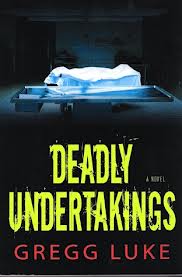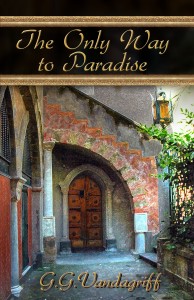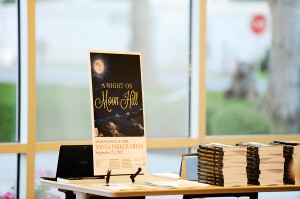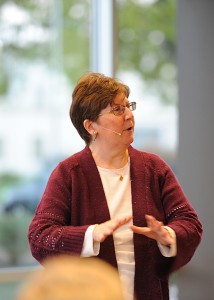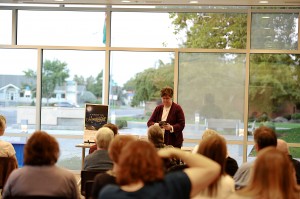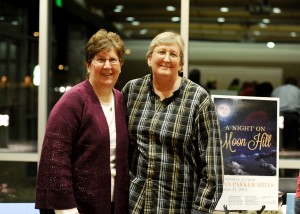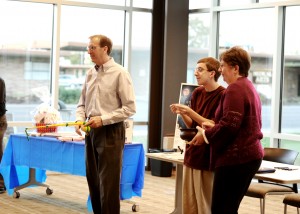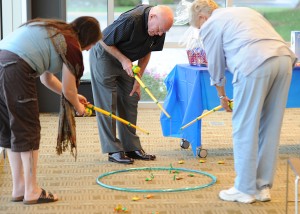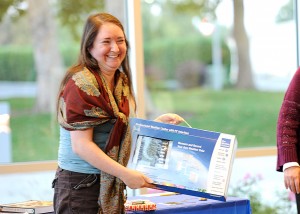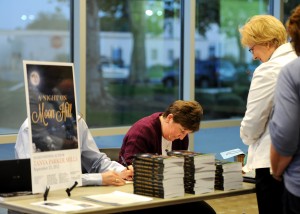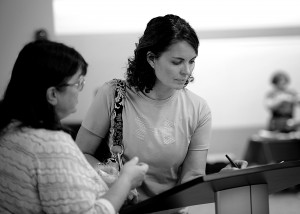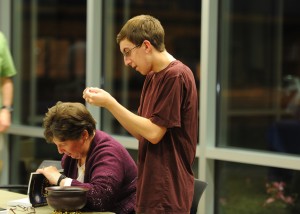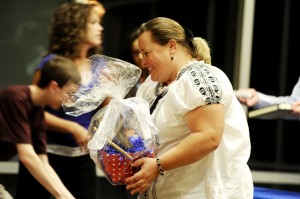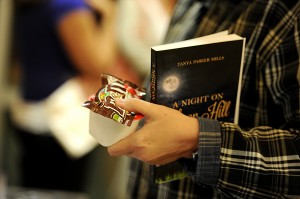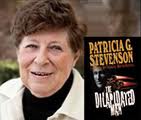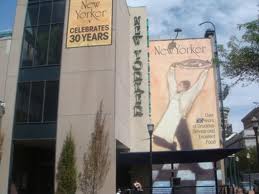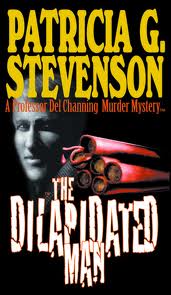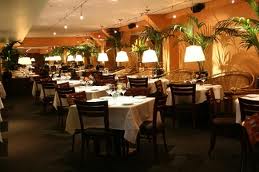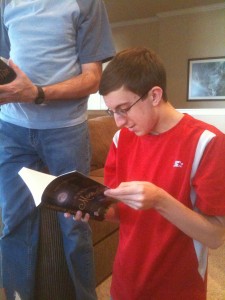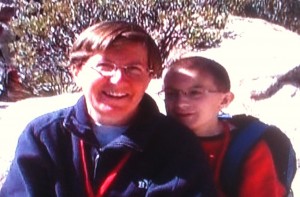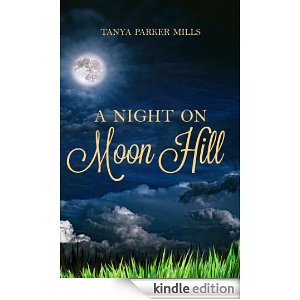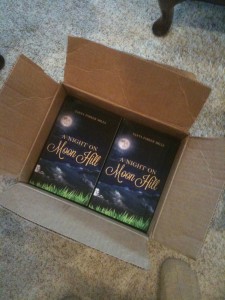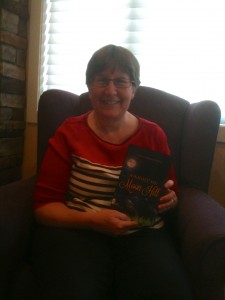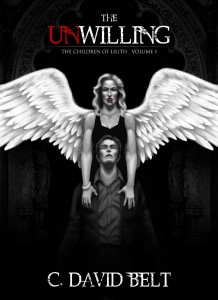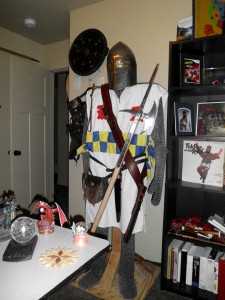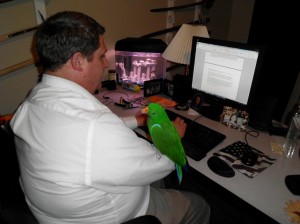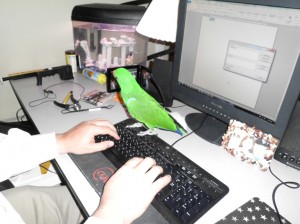(Note: A comment on this post earns you a shot at winning an autographed copy of my new book, A NIGHT ON MOON HILL.)
Having now penned six medical thrillers, Gregg Luke has definitely created his own niche among LDS authors, and all while dispensing drugs (legally) by day as a pharmacist. When I first met him at an LDStorymakers Conference, he struck me more as a blond-haired version of Tom Selleck (the mustache, of course) and so I wasn’t at all surprised to learn he wrote mystery thrillers. I should have suspected he’d be involved with movies, too.
Me: Tell me about the story you wrote in 4th grade that prompted your teacher to write “Wonderful imagination” on the paper? What was it about and do you still have it?
Gregg: Yes, I still have it. The story is about a village whose well had run dry. One day it rained so much that the well filled up. The mayor said each villager should only take enough water to survive. But someone came back that night and took even more. In the morning all his water was spoiled. No one could figure out the mystery until the guy finally confessed to having taken more. The mayor concluded that the water had been a gift from heaven and that the well would always remain full as long as no one else got greedy.
Yeah, I know it’s not very original, but hey, that was back in 4th grade! In retrospect, it sounds just like the Old Testament story of manna from heaven. I probably stole the story idea from a primary lesson. (Hmmm…he was into crime even back then.)
Me: When and why did you actually begin to consider writing a book that would be published? And what did you imagine your first book would be about at that time?
Gregg: I’ve always loved telling stories. Growing up I devoured the Willard Price adventure series. I decided right then that I wanted to write a bunch of novels filled with excitement, adventure, and cool facts.
I wrote numerous short stories for creative writing classes, but it wasn’t until I’d finished college that I thought I had the ability (or time!) to write a full novel.
My first novel was actually a Book of Mormon adventure that garnered an inch-thick stack of rejection letters.
(I think several of us have experienced that. It’s a rite of passage for any author . . . well, any author but Stephenie Meyer, perhaps.)
Me: Growing up in Santa Barbara, CA, I imagine you must have tried your hand (actually, your hands and feet) at surfing. You just strike me as the surfing type. If so, what did you like and what did you dislike about it? If not, why not? (And even if you weren’t a surfer, I must have a picture of you from your high school years.)
Gregg: Ha! I was definitely a beach bum, but I’ve actually never tried surfing. I was pretty good at boggie boarding (yes, it’s spelled that way) and volleyball, but my real passion was snorkeling and scuba diving. I think the best way to describe scuba diving is that it’s kind of like flying. You basically fly above the seabed, hovering, going up or down, and interacting with the marine life without ever having to touch the ground.
to scuba diving. What will he try next?
Me: In high school, what did you like more, writing or making movies? And why? Also, so many writers I know were into theater at some point in their lives. Were you involved with theater at all in high school?
Gregg: I think writing and movie making (and even song writing) are simply different means of storytelling. I’ve done all three, because (as I said earlier) I love storytelling. Each form has its own challenges, advantages and disadvantages, and appeal. I don’t necessarily like one over the other, but I think you can learn something from each that will strengthen your craft in the others. But back then I was definitely more into filmmaking. I love everything about the craft!
Yes, I was involved in theater and choral performance in high school. I was in a few choral groups and small plays, but I never went hardcore into the drama scene. I didn’t like the emphases prevalent in those days. You gotta remember that I grew up in the 70’s where the moral attitude was “if it feels good, do it.” I didn’t want to get involved with productions which promoted that viewpoint. (I guess my high school drama group was a little more tolerant of a strict Mormon. Sure, that attitude was around, but they didn’t push it on you.)
Me: I know you got a scholarship to BYU in Cinematography, so what made you change your major to Biologic Sciences? And did your mission to Wisconsin have anything to do with it? (Also, if you happen to still have one of your short films from those days, I’d love to feature it here. Hint, hint.)
Gregg: I got that scholarship because I had shown a short, special effects film I made to one of the department heads at the insistence of my mom. The summer before my mission, we were on a family vacation and I’d brought a few super8 movies with me to show my cousins. We stopped by BYU so my mom could see old friends (she’s an alum), she mentioned my material to one of her friends who had a friend in the film department, and before I knew it I was showing my work to a couple department heads. I didn’t think anything of it until my mission president suggested I apply to BYU because he’d heard they had a good film department. Next thing I knew I had a scholarship because one of the department heads remembered my material.
How did that transition to science? I’ve always been fascinated with the sciences. I love everything about discovering the world around us. I love learning how it ticks. I also love watching documentaries on nature. Some are painfully boring, others are riveting. The reason why? The good ones don’t simply disseminate facts, they tell a story. I guess my love of both disciplines melded into a single passion.
Me: Which has had more of an influence on your writing: biology (and your current occupation as a Pharmacist) or cinematography? And please explain how.
Gregg: Oh my career as a pharmacist has had a far greater influence on my writing. I can take just about any drug from my pharmacy shelves and with a few “what ifs” can create a story around it. Plus, I have an almost limitless cast of characters to choose from in the patients I encounter. (Some have even asked to be included in a novel. It’s a little disconcerting how many of those want to be villains instead of heroes!) (Okay, I’m not a patient, but can I be a heroine?)
Me: Please describe your writing space as if a killer is sneaking in and trying to learn clues about the occupant in order to murder him. (And provide a picture, as well . . . not of the murder, but of your writing space. :D)
Gregg: Really? Um, okay. Remember, you asked for it.
The small house was quiet, unassuming. Entering it had been child’s play. The intruder knew the occupants were simply empty-nesters with no real assets or valuables worthy of theft. But that’s not why she was there.
No one was home. The only living creature was an overweight, yellow cat that spent ninety percent of its life asleep. The cat was nowhere in sight. No matter. The moment was now. She’d done just enough research to know her timing was perfect.
Just inside the front door, the intruder passed a display case of archaic pharmacy paraphernalia. Glancing at the ancient medicines, she allowed herself a rare smile, imagining with a morbid sense of irony which one might complete her nefarious task with the maximum amount of suffering.
She shook her head and continued down the hallway. The first room had been converted into a small library. Such arrogance; such temerity. Even without going in she knew the shelves would be lined with his twisted taste in literature. Dean Koontz. Steven King. Stephanie Black. They were all there. All the sickos. And more. There was probably an entire shelf devoted purely to his own macabre writing. She harrumphed, knowing she could write circles around him with one hand tied behind her back . . . in her sleep . . . having gone weeks without food or water . . . or brushing her teeth.
The next room was his office. Two L-shaped desks; one for him, the other for his wife. She wrote YA fantasy: Marvelous, uplifting material that had real substance. He wrote repugnant, implausible drivel; predictable hogwash rife with blood, guts, gore, and big words that nobody knew how to pronounce, much less what they meant. The left side of his desk held his HP laptop; the right side a large blotter on which he scrawled seemingly important notes, trivial appointments, and upcoming deadlines.
Dead-lines, she snickered inwardly. Oh, there would be some very “dead” lines on that desktop real soon. The hutch above the blotter was ideal for her plans. Two sliding doors hid an assortment of reference books and teaching materials. But there was room for a bomb, too.
The rare smile returned as she removed a high yield, thermal nuclear warhead with a nominal aspect of thirty kilotons of enriched uranium, all cleverly disguised in her Mary Kay compact. Oh yes. Yes! Finally, this would be the end to Gregg Luke’s sophomoric authorship. Never again would she be drawn into his macabre tales of disease and death, which kept her up at night with really, really yucky dreams.
Setting the trigger to detonate in precisely forty minutes, the time at which he’d return from home teaching, she slid open one of the hutch doors—and gasped. Sitting inside the cubby, with a look of smug superiority and imminent doom, the yellow cat crouched poised for attack. Obviously overlooked in her shoddy research, she did not realize that the cat was a seventh-level Ninja. In a blinding flash the cat lunged, subdued the intruder, deactivated the bomb, and returned to the foot of his master’s bed to continue his nap.
The rest is history.
(Nicely done, but drat! You made me the villain. Ha! I flatter myself.)
Me: After giving scriptural fiction a couple of tries, you seem to have found your stride by becoming the Michael Crichton of LDS medical thriller writers with such hits as BLINK OF AN EYE, ALTERED STATE, BLOODBORNE and the recent DEADLY UNDERTAKINGS. Any plans on following him further down the science fiction path and creating something “Jurassic Park”-like?
Gregg: Wow, I’ll take that compliment! Thanks! My hero is the late Michael Crichton. He graduated from Harvard Medical School, but never really practiced medicine because he had more fun writing novels and making movies.
I’ve never written any sci-fi to speak of. I suppose I could try but I really like writing copy that has its foundation in real science. I believe that adds to its creepability (new word?). It’s one thing to say a mutation-causing element was discovered in a galaxy far, far away; it’s another to say this virus is REAL and it CAN cause the horrible things I describe. Jurassic Park the novel was infinitely better than the movie(s) because Crichton used actual science (with a little speculative license) to recreate the dinosaurs. I think I came close to that in Altered State. SPAAM is a chemical of my own making, derived from existing chemicals that function as I described in the book. Whether they actually allow for mind control is another matter; but the chemistry behind it is real. (Having a very unscientific mind, I’ll just have to take your word for that.)
Me: Given your background in film, do you storyboard your novels, or how would you describe your writing process? And what are you working on now?
Gregg: Believe it or not, I’m more of a discovery writer. (Me too!) I have blocks of information and disclosure that are arranged in a specific order, but I have no idea how I’m going to get from point A to point B until my characters take me there. However, in writing any scene I always “watch the movie in my head” before I begin typing. I’ve had several readers say my novels read like watching a movie, and that’s why. I use many of the elements of good filmmaking in my storytelling.
I’m currently working on about four projects. One is nearly complete, one is well under way, and two are still in their infancy. I just completed a collection of scary stories for Halloween 2013. I was asked to co-author the collection with Stephanie Black and Traci Abramson. We each wrote a Halloween-themed novella to be compiled by Covenant into one book. I’m very excited about it. I’m also dabbling in adapting Do No Harm into a screenplay. Time will tell if that pans out (pun intended). :D
Me: Finally, is it true that you used to fence, and, if so, how did you become introduced to the sport? (I’d love a picture of you in fencing attire, preferably in the middle of a match or a practice session.)
Gregg: Okay, now you’re scaring me. How the heck did you know that?
I like doing things out of the norm (big shock, I know). When required to take a foreign language in college, instead of taking Spanish like everyone else, I took Japanese. Instead of taking a basic gym class, I took fencing. I loved it. My coach was a former coach of the Russian Olympic team. I fought epée. But I wasn’t very good. My size was a mixed-blessing. I had a three-meter lunge, but I also presented a pretty large target to skewer.
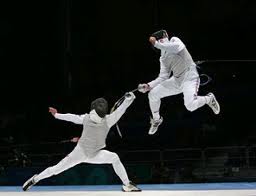 Gregg getting skewered! (Just kidding . . . this is what he gets for not providing any pics)
Gregg getting skewered! (Just kidding . . . this is what he gets for not providing any pics)
Wow, Tanya, this was fun. Talk about walking down memory lane! Thanks for your interest in my less-than-average life. It’s been fun, and I certainly hope it continues. I feel very, very blessed (and I hope that continues too).
Seriously, it was fun for me too. I wish you had your website up and working so I could point our readers to it, but you can check out all of Gregg’s books here and maybe even buy one!
Originally posted 2012-10-10 06:00:41.




